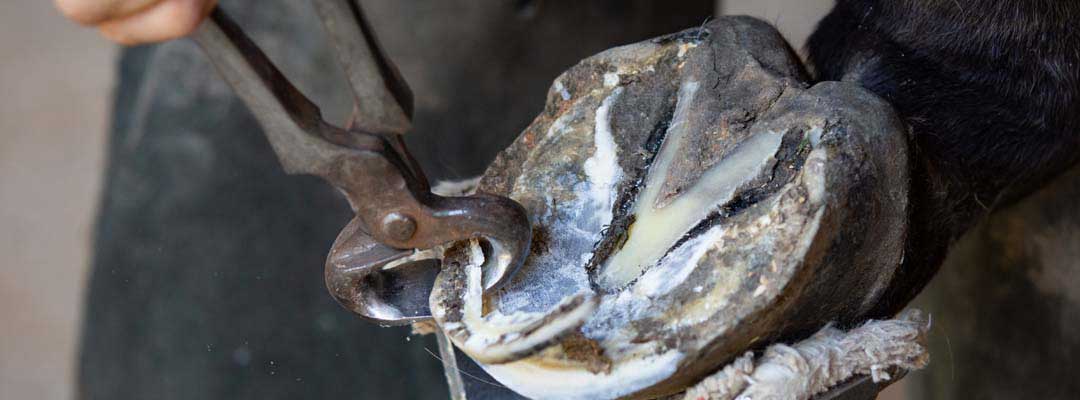Horse Hoof Cracks 101
Farrier shares tips on managing hoof cracks and equine hoof care maintenance

The old adage, “no hoof, no horse” is more than a saying. Keep stride with hoof care maintenance to help avoid hoof cracks.
What causes hoof cracks in horses?
There are several factors that can result in hoof cracks, including:
“If you let your horse go without trimming for extended periods of time, their hooves become real long, split and break off. Because of this, they will have a greater potential to crack, especially if the weather is dry,” cautions John McGuire, a farrier of 27 years.
My horse has a hoof crack. What should I do?
Determine which kind of hoof crack your horse has and make either your farrier or veterinarian aware. They can work with you to reduce chances of lameness and infection.
What are the different types of hoof cracks in horses?
Vertical hoof cracks
These are the most common of hoof cracks, running perpendicular to the ground. Vertical cracks that originate at the coronary band and grow downward are the most concerning.
Horizontal cracks and hoof blowouts
This common crack can occur after injury to the coronary band or a direct impact to the hoof wall.
Toe cracks
This is a common result of heel pain, as horses put more weight on the toe to avoid discomfort. These cracks occur with repeated pressure on the hoof’s front portion.
Grass cracks
Usually superficial and thin, grass cracks are commonly experienced when horses have long, unshod hooves; environmental changes, lack of nutrition or impaired blood flow to the hoof also contribute. They often begin from the ground and move upward and are easily corrected with regular farrier work.
Quarter cracks
Quarter cracks usually start at the coronary band and travel toward the ground. They are caused by trauma, conformational issues and lack of regular trimming. Landing unevenly can cause a quarter crack in the hoof.
Sand cracks
Sand cracks extend downward and occur after a coronary band injury or from white line disease at the coronary band.
Bar cracks
These painful cracks occur on the bars of a horse’s hooves (the area on both sides of the frog). Horses that have experienced direct impact to the bar, or have weak and unbalanced bars, are more susceptible to bar cracks.
How can I prevent hoof cracks?
Take steps to help ensure your horse has the healthiest hooves for his ultimate performance.
“I’m a firm believer in hoof products like Rain Maker, Hoof Flex and Horseshoer’s Secret. Using these products will help prevent hoof cracks more than anything, that along with regular trimming and maintenance on the horse. I’ve also had a lot of clients use hoof supplements. For those horses who are lacking in certain minerals that promote healthy hooves, I really think you can see a difference,” McGuire said.
Valley Vet Supply carries a number of high-quality hoof supplements. Good hoof supplements will include B-vitamins (mainly biotin), minerals essential to hoof strength (zinc, manganese and copper), and amino acids (methionine and lysine) for the proteins that provide the elasticity of the hoof. Examples would be Command Hoof, Command Coat and Hoof and Horseshoer’s Secret.
Look to trusted hoof care products and implement the preventive tips above to help ensure sound rides with your horse!


